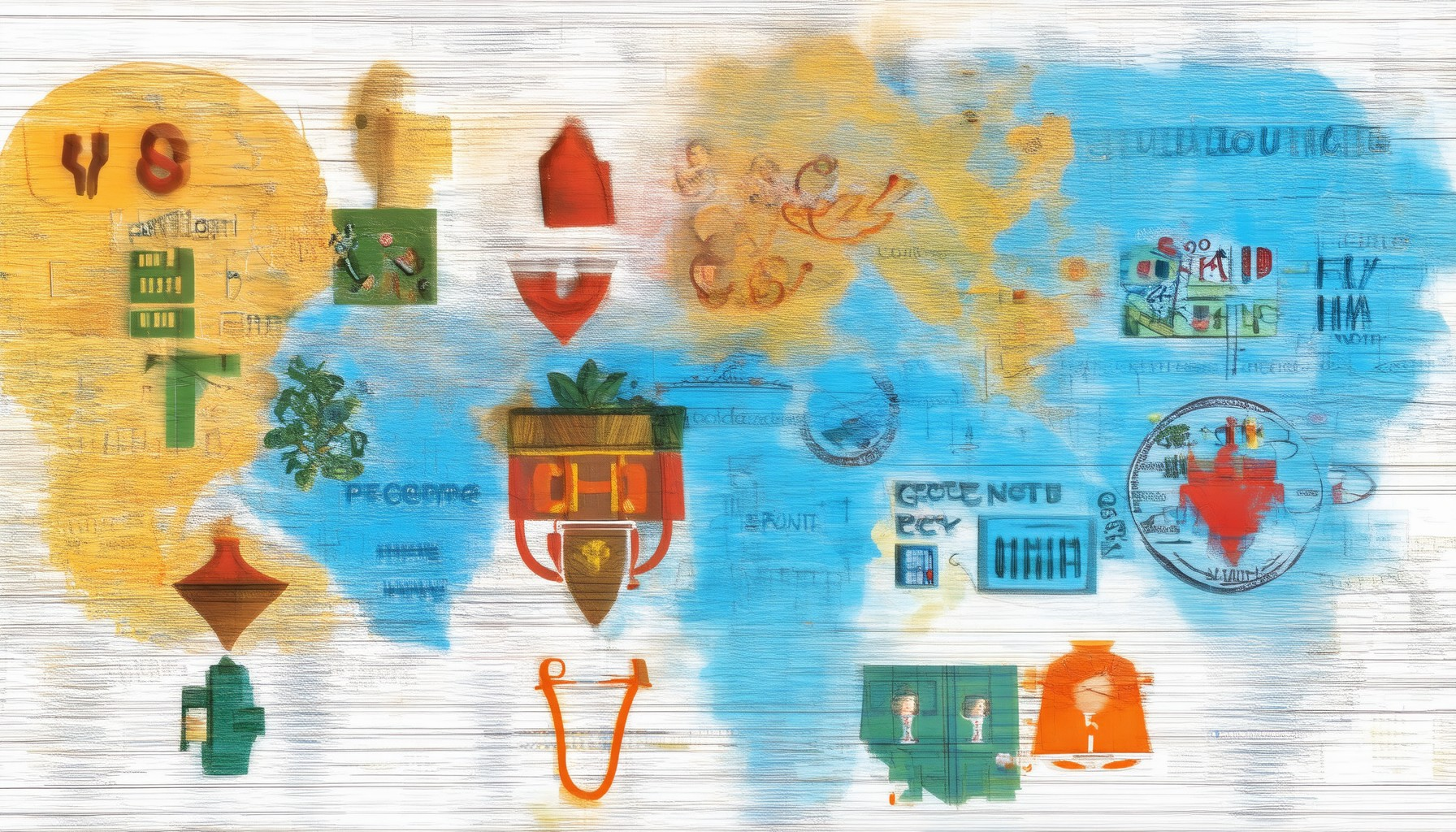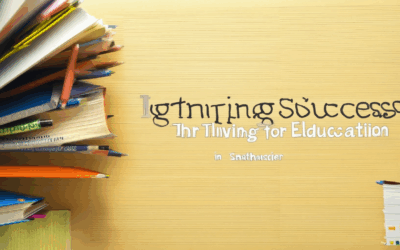Exploring the intricate dynamics of educational growth, this comprehensive guide delves into the significance of educational articles as valuable resources for fostering personal and professional development. From understanding the concept of educational growth to discovering top platforms offering academic materials, this article serves as an essential roadmap for anyone seeking to enhance their knowledge and skills. Whether you’re a student aiming to excel, a teacher looking to refine your strategies, or a parent eager to support your child’s learning journey, this guide provides actionable insights and expert recommendations. By examining the role of education in cognitive and personal growth, alongside the latest trends and debates in educational methodologies, this article offers a well-rounded perspective on leveraging educational articles to achieve your goals. Prepare to uncover how access to high-quality educational resources can unlock new opportunities for growth and success.
Key Takeaways
- Enhances Economic Growth: Education boosts productivity, innovation, and critical thinking, driving economic progress and giving nations a competitive edge.
- Empowers Individuals: Provides access to opportunities, improves decision-making, and builds confidence, fostering personal and career growth.
- Fosters Social Cohesion: Bridges socioeconomic gaps and strengthens community bonds through shared understanding and inclusivity.
- Improves Global Competitiveness: Develops skilled workforces, attracting businesses and enhancing a nation’s global standing.
- Cultural Preservation and Advancement: Introduces diverse perspectives, enriches heritage, and prepares individuals for a globalized world.
- Reduces Poverty and Unemployment: Education equips individuals with job-ready skills, lowering unemployment and lifting communities out of poverty.
- Promotes Health and Wellness: Encourages informed decision-making and healthier lifestyles through education campaigns.
- Supports Environmental Stewardship: Teaches sustainable practices, fostering conservation and responsible resource management.
- Encourages Critical Thinking: Develops problem-solving and analytical skills essential for personal and professional success.
- Builds Social and Communication Skills: Enhances collaboration and effective communication, crucial for strong relationships and career advancement.
- Provides Career Opportunities: Leads to better job prospects and financial stability, empowering individuals to thrive.
- Develops Adaptability and Resilience: Exposure to diverse experiences helps individuals navigate change and overcome challenges.
- Instills Self-Discipline and Motivation: Consistent attendance and goal-setting cultivate discipline, driving proactive behavior.
- Cultivates Empathy and Understanding: Education broadens perspectives, fostering compassion and inclusive societies.
- Fuels Lifelong Learning: Sparks curiosity and a love for learning, enabling continuous growth and adaptation.
- Nurtures Problem-Solving and Creativity: Challenges individuals to innovate, driving progress across industries.
- Creates Valuable Networks: Provides opportunities for professional connections and support throughout one’s career.
- Drives Societal Progress: Fosters cultural awareness and innovation, ensuring societal resilience and preparedness for future challenges.
- Contributes to Individual Success: Empowers social mobility, improving quality of life and creating opportunities for future generations.
- Strengthens Social Cohesion: Promotes understanding and empathy, building collaborative and peaceful communities.
- Boosts Global Competitiveness: Positions nations as leaders in innovation, research, and international relations through a skilled workforce.
What Does Educational Growth Mean?
Educational growth refers to the process of acquiring and applying knowledge, skills, and competencies that contribute to personal development and lifelong learning. It encompasses not only academic achievements but also the ability to adapt, innovate, and thrive in dynamic environments.
The Importance of Educational Growth
Educational growth is essential for individuals, communities, and societies. It fosters critical thinking, creativity, and problem-solving abilities, enabling people to navigate challenges and opportunities effectively. By continuously growing educationally, individuals unlock doors to better career prospects, personal fulfillment, and societal contributions.
Key Factors Influencing Educational Growth
Several factors play a crucial role in shaping educational growth:- Curriculum Design : Access to comprehensive and relevant curricula enhances learning experiences.- Teaching Methods : Engaging and effective teaching approaches facilitate deeper understanding and retention.- Support Systems : Access to resources, mentorship, and extracurricular activities promotes holistic development.- Lifelong Learning Opportunities : Continuous exposure to new ideas and experiences keeps minds sharp and adaptable.
Strategies for Fostering Educational Growth
To maximize educational growth, consider the following strategies:- Leverage Technology : Utilize digital tools and platforms to enhance learning accessibility and engagement.- Encourage Collaboration : Work with peers, mentors, and communities to broaden perspectives and gain diverse insights.- Stay Curious and Motivated : Maintain a genuine interest in learning and set personal goals to drive continuous improvement.
By prioritizing educational growth, individuals can unlock their full potential and contribute meaningfully to their personal and professional lives.
Where Can I Get Educational Articles?
There are several platforms and resources available where you can access educational articles:
- General Education Platforms:
- Coursera – Offers a variety of courses and associated educational articles.
- Udemy – Provides tutorials, webinars, and articles on diverse subjects.
- Subject-Specific Resources:
- Medium – A platform with articles across numerous educational topics.
- LinkedIn Learning – Features professional development courses and articles.
- edX – Offers courses and related materials, including articles and research papers.
- Specialized Niche Websites:
- Smashing Magazine – Focuses on design education with insightful articles.
- Creative Commons – Provides free educational resources and articles.
- Khan Academy – Offers educational materials for K-12 and beyond.
- Video and Community Platforms:
- YouTube – While primarily video-based, many channels share educational articles in descriptions.
- Reddit Communities – Check subreddits related to education for article links and discussions.
- University and College Resources:
- College and University Websites – Often have articles and research papers available to the public.
- Niche and Professional Platforms:
- OpenSAP – Focuses on SAP-related education with articles and resources.
- Skillshare – Offers courses and articles for various skill development areas.
- MasterClass – Provides in-depth classes and related educational articles.
Has Growth Mindset Been Debunked?
The concept of the growth mindset, popularized by Carol S. Dweck, posits that individuals can develop their abilities through dedication and hard work. However, recent research and critiques have raised questions about its universal effectiveness.
A 2019 meta-analysis of 156 studies on growth mindset interventions revealed mixed results. While some studies showed benefits, particularly among students struggling academically, others found no significant impact, especially among high-performing students. This suggests that the growth mindset may not be equally effective across all contexts.
Critics argue that the growth mindset can sometimes lead to a “fixed mindset” in certain situations, where individuals believe their abilities are innate and cannot be changed. This counterargument highlights potential limitations of the theory.
Moreover, the effectiveness of growth mindset interventions may depend on factors such as implementation quality, duration, and target group. Studies with small sample sizes or specific age groups might not generalize well.
Some educators advocate for a hybrid approach, combining growth and fixed mindsets, to provide a more flexible framework for learning.
In conclusion, while the growth mindset has shown promise in certain contexts, its effectiveness is not universal. Its success likely hinges on careful implementation and application, and it remains a debated topic in educational circles.
How Does Education Promote Growth?
Education plays a pivotal role in fostering growth across various dimensions of society. It serves as a cornerstone for personal development, economic progress, and societal advancement. Here’s a structured overview of how education contributes to growth:
- Economic Development
Education enhances productivity, innovation, and critical thinking skills, which are vital drivers of economic growth. A workforce equipped with advanced knowledge and skills contributes significantly to a nation’s competitive edge, attracting investment and stimulating industries. According to studies, countries with higher levels of education experience faster economic growth compared to those with lower educational attainment. - Personal Growth and Empowerment
Education empowers individuals to unlock their potential, enabling them to pursue fulfilling careers and contribute meaningfully to their communities. It provides access to opportunities, improves decision-making abilities, and instills confidence, ultimately fostering individual growth and self-realization. - Social Cohesion and Equality
Education bridges socioeconomic gaps by providing equal opportunities for all individuals, regardless of their background. It promotes understanding and empathy, reducing societal divisions and strengthening community bonds. A well-educated society is more likely to embrace inclusivity and work collaboratively toward common goals. - Global Competitiveness
In today’s interconnected world, education is a key factor in global competitiveness. Nations that invest in education develop skilled workforces, which are essential for attracting international businesses and maintaining a strong global presence. This, in turn, drives economic growth and innovation on a worldwide scale. - Cultural Preservation and Advancement
Education serves as a vehicle for cultural preservation and evolution. It introduces individuals to diverse perspectives, enriches cultural heritage, and encourages creative expression. A culturally aware and educated population is better equipped to navigate an increasingly globalized world. - Reducing Poverty and Unemployment
Education is a powerful tool in the fight against poverty. It provides individuals with the skills needed to secure stable jobs and escape the cycle of poverty. Countries with higher literacy rates typically experience lower unemployment rates, contributing to overall economic stability. - Health and Wellness
Education extends beyond academics, influencing health and wellness outcomes. Awareness campaigns, health education programs, and informed decision-making are all products of education, leading to improved public health and reduced healthcare costs. - Environmental Stewardship
Education equips individuals with the knowledge and skills to address environmental challenges. It fosters sustainable practices, encouraging conservation efforts and responsible resource management, which are crucial for long-term growth and the health of our planet.
By investing in education, we lay the foundation for a brighter future. It is not just about academic achievement but about empowering individuals, driving economic progress, and building stronger, more resilient communities. At Enroll Maven, we understand the transformative power of education and strive to provide resources that support your journey toward growth and success. Explore our guides and articles to discover how education can unlock your potential and contribute to the growth of your future.
How Does Education Provide Personal Growth?
Education is a powerful tool that fosters personal growth by enhancing cognitive abilities, expanding perspectives, and promoting self-awareness. Here are the key ways education contributes to individual development:
- Critical Thinking and Problem-Solving Skills
Education equips individuals with the ability to analyze complex situations, evaluate options, and make informed decisions. This skillset is invaluable for navigating life’s challenges and opportunities. - Social and Communication Skills
Through interactions in educational environments, individuals learn to collaborate, communicate effectively, and understand diverse viewpoints. These skills are essential for building strong relationships and advancing in various fields. - Career Opportunities and Financial Stability
Education often leads to better job prospects and higher earning potential. It provides individuals with the tools needed to succeed in their chosen careers and secure financial stability. - Adaptability and Resilience
The exposure to different ideas and experiences in educational settings helps individuals develop adaptability. They learn to navigate changes and overcome obstacles, which is crucial for personal growth. - Self-Discipline and Motivation
Consistent attendance to education and meeting academic goals instills discipline. This trait translates into other areas of life, fostering motivation and a proactive approach to challenges. - Empathy and Understanding
Education encourages individuals to see things from different perspectives, cultivating empathy. This understanding enhances interpersonal relationships and contributes to a more compassionate society. - Lifelong Learning and Curiosity
Education sparks curiosity and a love for learning. This mindset enables individuals to continuously grow and adapt to a rapidly changing world. - Problem-Solving and Creative Thinking
Educational experiences challenge individuals to think creatively and find innovative solutions to problems. This skill is vital in many industries and drives progress. - Networking and Professional Connections
Through educational programs and events, individuals build valuable networks. These connections can open doors to new opportunities and provide support throughout their careers.
By investing in education, individuals unlock a wealth of benefits that contribute to their personal and professional growth. Education is not just about acquiring knowledge—it’s about becoming a better version of oneself.
How Does Education Play a Role in Development?
Education is a cornerstone of societal progress, serving as a catalyst for individual growth and collective advancement. Its impact extends far beyond traditional academic settings, influencing various facets of development.
Societal Progress
Education fosters cultural awareness and intellectual curiosity, driving innovation and societal evolution. By promoting critical thinking, it enables societies to adapt to changing environments, ensuring resilience and preparedness for future challenges.
Economic Growth
Economically, education equips individuals with skills necessary for productivity and entrepreneurship. A educated workforce drives economic development, fostering innovation and competitiveness. Countries investing in education often experience sustained economic growth, as informed citizens contribute to a thriving economy.
Individual Success
Education is the primary pathway to social mobility. It empowers individuals to achieve financial stability, improve quality of life, and create opportunities for future generations. Accessible and equitable education ensures that everyone has the chance to thrive, reducing socioeconomic disparities.
Social Cohesion
Education promotes understanding and empathy, bridging cultural divides. It encourages collaboration and respect, essential ingredients for peaceful coexistence. Educated communities are better equipped to address challenges and work toward common goals, strengthening societal bonds.
Global Competitiveness
In a globalized world, education is a competitive advantage. Nations with high educational standards excel in innovation, research, and international relations. A skilled workforce attracts investment and partnerships, positioning countries as leaders on the global stage.
Enroll Maven offers valuable resources to support your educational journey, from effective learning strategies to college preparation. Explore our platform to discover tools and insights designed to empower learners at every stage.
- Learning Strategies – Master effective techniques for academic success
- College Prep Guide – Plan for a successful university experience
- Educational Resources – Access a wealth of study materials
By investing in education, we unlock potential, drive progress, and build a brighter future for all. Visit Enroll Maven to explore how education can transform your life and contribute to global development.









0 Comments